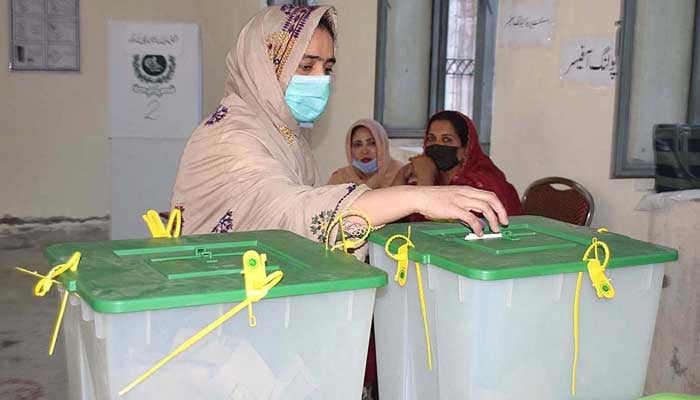Inclusive elections
Pakistan has a record 128 million people – constituting over half of its total population – registered as voters for the upcoming general elections
According to a Free and Fair Election Network (Fafen) report titled ‘Electoral Rolls, General Election 2024’, with the fifth-highest number of registered voters globally, Pakistan has a record 128 million people – constituting over half of its total population – registered as voters for the upcoming general elections scheduled for February 8. This marks a substantial increase of 22.5 million voters, including 12.5 million women added since 2018. Remarkably, this is also the first time that Pakistan registered more women voters as compared to men in between two elections, from 2018 to 2024; the number of women voters has climbed up by 27 per cent. With such impressive numbers, one would think that since the number of women voters is so high, women’s participation in the electoral process must be equally impressive. However, the reality is far from it. Last week, a 30-member group of clerics – mostly from the Jamiat Ulema-e-Islam Fazl (JUI-F) – unanimously issued a decree that parties competing for elections in Kohistan would not be allowed to send female members for door-to-door campaigning to gain voters in different constituencies of the district. In their decree, the group of clerics strictly banned canvassing by women.
This was rightly condemned by many, and some analysts believed that the order was nothing more than an intimidation tactic to stop women from breaking the vote bank of men contesting from the same area. However, the Election Commission of Pakistan (ECP) was quick to take notice of this restriction and the Kohistan district monitoring officer declared the matter to be a result of ‘misunderstanding’. But this misunderstanding was admitted only after the ECP warned that it would declare the constituency null and void if any woman was prevented from conducting an electoral campaign or casting a vote in the area. On a positive note, Khyber Pakhtunkhwa chief khateeb Mufti Tayyab Qureshi on Thursday cleared that there are no religious restrictions on women for participating in elections as voters. It is not only clerics who are against the political participation of women; at the core of it is our society’s patriarchal structure which is designed to keep women away from the electoral process. Despite their tall claims about women’s empowerment, political parties barely take steps to nominate women for general seats.
Pildat’s Ahmed Bilal Mehboob has pointed out that despite the minimum 5.0 per cent threshold prescribed in the Elections Act 2017, women candidates nominated by the political parties on general seats barely constitute around 4.77 per cent this time when collectively assessed both for the national and provincial assemblies’ seats. When political parties behave this way, it is impossible to expect that women working in other fields will have access to equal opportunities. Change comes from above, which is why all political parties are responsible for ensuring that their women members and supporters are provided with equal opportunities, including tickets to contest elections on general seats. They must also ensure that women are in decision-making positions in their parties and that the term ‘women’s empowerment’ is not the buzzword they use to lure votes and that they genuinely want to bring women to the forefront of politics. Only then will the country and society change.
-
 Shia LaBeouf Makes Bold Claim About Homosexuals In First Interview After Mardi Gras Arrest
Shia LaBeouf Makes Bold Claim About Homosexuals In First Interview After Mardi Gras Arrest -
 Princess Beatrice, Eugenie ‘strained’ As They Are ‘not Turning Back’ On Andrew
Princess Beatrice, Eugenie ‘strained’ As They Are ‘not Turning Back’ On Andrew -
 Benny Blanco Addresses ‘dirty Feet’ Backlash After Podcast Moment Sparks Online Frenzy
Benny Blanco Addresses ‘dirty Feet’ Backlash After Podcast Moment Sparks Online Frenzy -
 Sarah Ferguson Unusual Trait That Confused Royal Expert
Sarah Ferguson Unusual Trait That Confused Royal Expert -
 Prince William, Kate Middleton Left Sarah Ferguson Feeling 'worthless'
Prince William, Kate Middleton Left Sarah Ferguson Feeling 'worthless' -
 Ben Affleck Focused On 'real Prize,' Stability After Jennifer Garner Speaks About Co Parenting Mechanics
Ben Affleck Focused On 'real Prize,' Stability After Jennifer Garner Speaks About Co Parenting Mechanics -
 Luke Grimes Reveals Hilarious Reason His Baby Can't Stop Laughing At Him
Luke Grimes Reveals Hilarious Reason His Baby Can't Stop Laughing At Him -
 Why Kate Middleton, Prince William Opt For ‘show Stopping Style’
Why Kate Middleton, Prince William Opt For ‘show Stopping Style’ -
 Here's Why Leonardo DiCaprio Will Not Attend This Year's 'Actors Award' Despite Major Nomination
Here's Why Leonardo DiCaprio Will Not Attend This Year's 'Actors Award' Despite Major Nomination -
 Ethan Hawke Reflects On Hollywood Success As Fifth Oscar Nomination Arrives
Ethan Hawke Reflects On Hollywood Success As Fifth Oscar Nomination Arrives -
 Tom Cruise Feeling Down In The Dumps Post A Series Of Failed Romances: Report
Tom Cruise Feeling Down In The Dumps Post A Series Of Failed Romances: Report -
 'The Pitt' Producer Reveals Why He Was Nervous For The New Ep Of Season Two
'The Pitt' Producer Reveals Why He Was Nervous For The New Ep Of Season Two -
 Maggie Gyllenhaal Gets Honest About Being Jealous Of Jake Gyllenhaal
Maggie Gyllenhaal Gets Honest About Being Jealous Of Jake Gyllenhaal -
 'Bridgerton' Star Luke Thompson Gets Honest About Season Five
'Bridgerton' Star Luke Thompson Gets Honest About Season Five -
 Prince William On Verge Of Breakdown Because Of 'disgraced' Andrew
Prince William On Verge Of Breakdown Because Of 'disgraced' Andrew -
 Tig Notaro Reflects On Oscar Nod For 'Come See Me In The Good Light': 'I Was Sleeping'
Tig Notaro Reflects On Oscar Nod For 'Come See Me In The Good Light': 'I Was Sleeping'




